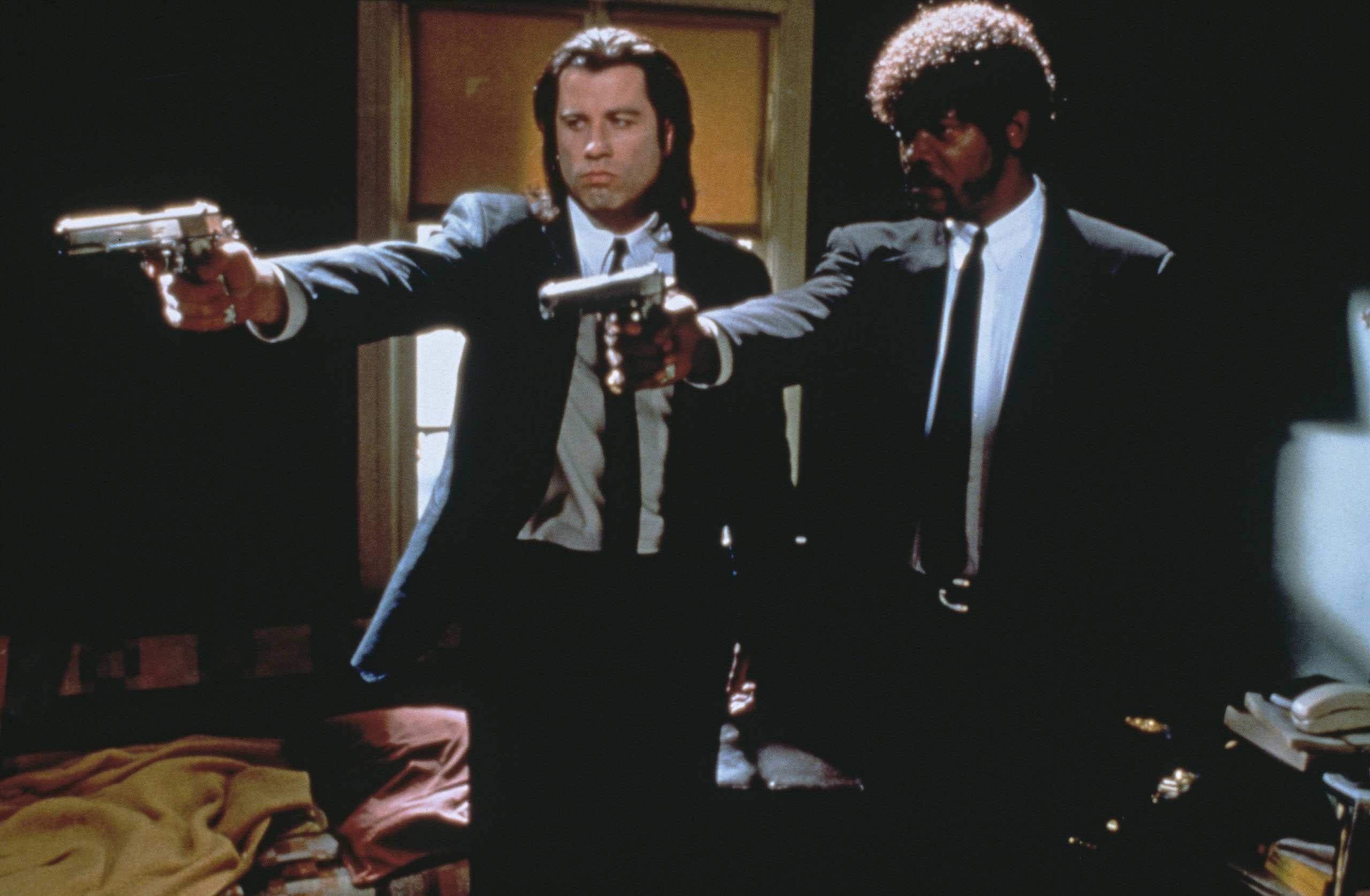A generic [SPOILER ALERT]
Few directors have as much sustained success as Quentin Tarantino. The man is 8 for 8 on directorial efforts, with each story riveting in one way or another. Even the mighty Steven Spielberg has 1941 or the 4th Indiana Jones on his resume: Tarantino’s is spotless. However, the director has a clear masterpiece. At the top of Tarantino’s resume is Pulp Fiction, a movie that not only redefined the gangster movie, but spawned an entire generation of filmmakers with its originality born of movie geekdom.
Describing the plot of Pulp Fiction is rather complex, but it is essentially 3 main parts with countless little tangents:
- Hitmen Jules (Samuel L. Jackson) and Vincent (John Travolta) are trying to recover a briefcase stolen by Brett (Frank Whaley) that belongs to their boss, Marcellus Wallace (Ving Rhames).
- Vincent takes Marcellus’s wife Mia (Uma Thurman) out for a drug fueled night of fun.
- Butch (Bruce Willis), an over the hill boxer, goes on the run after costing Marcellus Wallace lots of money in a fight.
Tarantino makes it very clear that his job in a video store made him the filmmaker he is today. Pulp Fiction encapsulates what makes him so special: he combines homages to some of his favorite films and mixes them with his own ideas to create a unique and fascinating voice and tone. Within story #1, you have Pumpkin (Tim Roth) and Hunny Bunny’s (Amanda Plummer) robbery idea taken from The Great Train Robbery and the glowing briefcase from Kiss Me Deadly. However, Tarantino mixes them into a story that is told out of order with no apparent connection until the very end of the film, when it all snaps into place, which he took from the legendary French filmmaker Jean-Luc Godard among others. I’d say the biggest contribution Tarantino placed into the movie world is using violence as a punch line to a joke. When Vincent accidentally shoots Marvin (Phil LaMarr), I remember being mildly confused, but then bursting out laughing. This technique has been repeated by all sorts of filmmakers since, but Tarantino is the originator. This wacky mix of ultra specific old and new gives Pulp Fiction a sense of style that all Tarantino movies have to varying degrees.
Style can only take a movie so far, at some point though, you need substance, and Tarantino’s writing talents couldn’t be more amazing than in Pulp Fiction. What’s so great about Tarantino’s dialogue is how much it accomplishes setting up an intimidating array of great characters while still being amazing to listen to. Jules’s manner of speaking helps the audience understand how pensive and poetic the guy is, so when he delivers his legendary Ezekiel monologue, it totally fits the character. Vincent’s Amsterdam stories give us an idea he’s happy being glazed by many drugs and not your run of the mill thug, like Jules. Butch’s gruff deliver makes him lovingly world weary, and Mia’s enthusiasm tells us she’s excited to be alive and live in the moment. And then think about the amazing lines Tarantino writes for them:
Jules: One of the greatest interrogations/monologues in movie history, among many other amazing lines.
Vincent: What a quarter pounder with cheese is called in metric system based Europe.
Butch: What happened to Zed?
Mia: What everyone says after they do a line of cocaine…
Tarantino has clear love for each and every one of his characters, which is why each of them gets at least one amazing line or monologue, and those words help propel Pulp Fiction forward, making the scenes between violence even more compelling than when stuff is going down.
The acting in Pulp Fiction is also quite amazing, with previously washed up or up and coming actors really delivering star making or remaking performances. John Travolta was a washed up actor before Pulp Fiction, and he’s so good here that one Oscar nomination later he got himself a second act resurgence. Sam Jackson was a “that guy” before Pulp Fiction made him a super duper star, starring in at least one major film per year, and gluing together 2 mega cinema franchises. Jackson is so good as Jules it makes you wonder why he’s getting orders from Marcellus Wallace, and if there were a hostile takeover, everyone would follow that guy. Bruce Willis was the die hard guy, and here he dials back and gives a really decent, nuanced performance as the deadbeat boxer Butch. He and Ving Rhames (as Marcellus Wallace) are excellent together, and Rhames is real good at channeling power or ferocious anger, making us understand why he’s calling the shots. Uma Thurman was in a few things before Pulp Fiction, but my oh my, her energetic and simultaneously drugged up Mia makes you understand why Tarantino wanted her again for Kill Bill. Harvey Keitel and Christopher Walken get just a few scenes, but they come out firing fastballs and disappear just as quickly. And I haven’t even mentioned Tim Roth, Frank Whaley, Amanda Plummer, Eric Stoltz, Rosanna Arquette, Peter Greene, Duane Whitaker, and Tarantino himself, who get little bits of time but bring just insane charisma and talent to their characters and deliver them to maximum effect.
Quentin Tarantino says that he is retiring after 10 films, which will leave a gaping hole in the movie business. Never has a director continually delivered fantastic stories, amazing characters, and quotable one liners like the mega talented foot loving writer director. I mean seriously, who thinks up lines like this. Or this? Or this??? Dude is one of a kind, and Pulp Fiction stands as a shining testament to Tarantino’s prodigious gifts.

